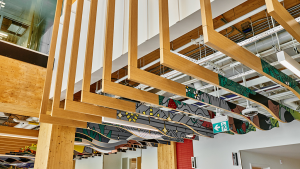During the fall of 2020 and spring of 2021, the City of Toronto and Province of Ontario were either in full lockdown or under stay-at-home orders due to COVID-19. Residential construction was permitted to continue, having been designated an essential service.
Nevertheless, proactive health measures undertaken by large construction companies have not protected them from complaints from workers and their union representatives.
A grievance filed by the Labourers’ International Union of North America, Local 183 against EllisDon Construction Ltd. and its formwork subcontractor, Verdi Structures Inc. provides an insight to the conflicting interests of corporate responsibility, public health and workers’ rights.
EllisDon and Verdi began working together on the construction of a 59-storey condominium project in downtown Toronto in December 2019. The formwork involving Verdi was in an open air environment without walls. Nevertheless, employees of both EllisDon and Verdi were instructed to maintain physical distancing wherever possible. In fact, some workers were sent home for failing to comply with these restrictions.
The 40 to 50 Verdi employees had been supplemented by other trades on the site since January 2020. There were often over 100 workers on site by May 2021.
In late February 2021, EllisDon implemented a company-wide rapid COVID-19 Antigen Screening Program (AP test) under the guidance of the Ontario Ministry of Health (MOH) and with support of other relevant government agencies. The condominium project in downtown Toronto was included among several others, based on size, location and transmission risks.
Tests were conducted twice a week on all workers entering the site. The AP test involved swabbing in the throat and bilateral lower nasal cavities, as approved by the MOH. Third party health professionals conducted the sampling and testing in a private setting, with results available in 15 minutes. No personal health information was gathered, only names and contact information for the purpose of communicating results to EllisDon and local public health units.
Those refusing tests were denied site access. Verdi employees who refused would to be reassigned elsewhere on a best-efforts basis and, failing that, would be laid off.
The test program was one of several health and safety steps taken by EllisDon. Health questionnaires, hand washing, PPE, staggered shifts and other measures now common across various work locations were included.
Specific to the Toronto condominium site, nine cases of COVID-19 were confirmed. Four were Verdi employees. All were detected off-site and confirmed positive at other public facilities.
The union filed a grievance, claiming EllisDon’s testing policy was “an unreasonable exercise of management rights and an unreasonable company policy or rule.”
While not denying the risks associated with COVID-19, the union claimed the measures far overshot scientific evidence confirming the risks to the project’s open air work site and that none of positive test results were detected through the onsite testing program. Furthermore, it asserted the other measures put in place were sufficient to meet any risks.
The union used mandatory drug and alcohol testing as a parallel. It cited a 2013 Supreme Court of Canada ruling that, “universal random testing for drugs and alcohol was an unreasonable exercise of management rights because the impact on employee privacy was found to be more severe than the expected gains.”
Arbitrator Robert Kitchen disagreed and dismissed the union’s grievance.
Among the factors informing his decision, Kitchen noted the transitory nature of the construction industry workforce and therefore the increased risk of community spread of COVID-19.
“The main employer interest in the present case is the safety of not only its workforce, which includes the workforces of various trades on site, but also the safety of the public,” ruled Kitchen. “I entirely agree with the employer that, given the seriousness of an outbreak, waiting to act until that happens, is not a reasonable option.”
In other words, any invasion of privacy was outweighed by the objective of preventing the spread of COVID-19, and on that basis EllisDon’s policy was reasonable.
John Bleasby is a Coldwater, Ont.-based freelance writer. Send comments and Legal Notes column ideas to editor@dailycommercialnews.com.










Recent Comments
comments for this post are closed